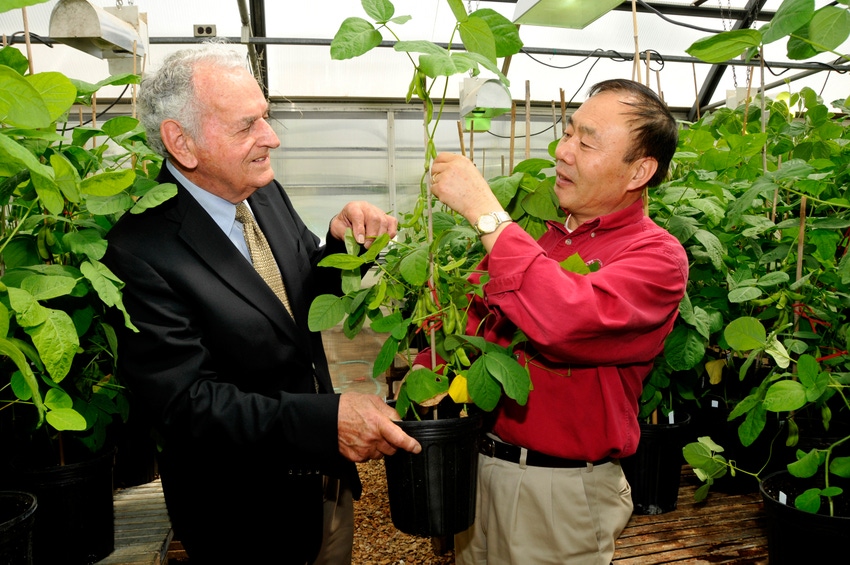May 2, 2012

The first edamame vegetable soybean variety developed in the United States and licensed for commercial production will be named "UA Kirksey" in honor of Joe Kirksey of Mulberry, Ark., a long-time soybean industry leader.
A former president of the Arkansas Soybean Promotion Board (ASPB) and vice president of the American Soybean Association, Kirksey became a member of the ASPB board of directors in 1966 and has served several terms on both the state and national boards of directors.
The UA Kirksey variety, developed by Professor Pengying Chen in the university’s soybean breeding program, will be grown in 2012 by Arkansas famers under contract to American Vegetable Soybean and Edamame, Inc. (AVS). AVS is building a plant in Mulberry to process, package and ship edamame. It is the first such plant in the United States.
Lanny Ashlock, ASPB director of research, said Chen's breeding program is recognized as one of the premiere publicly supported soybean breeding programs in the U.S. and receives significant financial support from the ASPB, which oversees the national soybean check-off program in Arkansas.
The 32,000-square-foot edamame facility in Mulberry will have about 40 full-time employees by this summer or fall and as many as 60 within three years, Kelly Cartwright, AVS chief operating officer, said.
"I consider this a great honor," Kirksey said. He said he and his wife, Chloe, will plant some UA Kirksey edamame seeds in a garden this year. "I've convinced several people who never heard of edamame soybeans to try them, and they all like them," he said.
Cartwright said UA Kirksey and another variety from China will be planted on 12 farms from the end of April through June for a staggered harvest on about 900 acres in the Arkansas River Valley from Alma to Conway and in White County.
The UA Kirksey variety was licensed to AVS, which will pay royalties to help support Chen's breeding program. He has more breeding lines under development for possible future edamame varieties.
"We don't see a ceiling on the market for edamame that will be shipped from Mulberry," Cartwright said. He said the acreage will likely double in 2013 and he expects it to continue to increase for several years.
Frozen edamame products are currently imported from Asia. JYC International, a major edamame importer based in Houston, is the parent company of AVS and will market Arkansas grown edamame to a large customer base of warehouse club chains and other retailers. They will be the first U.S. grown edamame products marketed on a commercial scale.
JYC President J.Y. "Gene" Chung said at a press conference to announce the plant's construction, "We are excited to be part of the larger Arkansas community and the city of Mulberry as we work together to make this new vegetable soybean industry successful and sustainable."
Cartwright said the 2012 edamame crop will include 250 acres of organically grown UA Kirksey soybeans on the farms of Joe Taylor and Shawn Peeples near Searcy in White County. In addition to UA Kirksey, a proprietary JYC variety from China will also be planted in 2012.
The Kirksey's have been leaders in Mulberry since Joe's father, Dr. Odell J. Kirksey, settled there in 1919. He was a family physician who made house calls until his death in 1966. Odell and his wife, Blanche, and Joe and Chloe Kirksey donated land for the Kirksey City Park and Fairgrounds in Mulberry.
A retired farmer who grew about 2,000 acres of soybeans annually and raised beef cattle, Kirksey has served as president of the school board, fair association, hospital board, Crawford County Fair Association and Lions Club, and on the boards of directors for two banks and Arkansas Valley Technical Institute. Two of the Kirksey's children, Myron Kirksey and Marcia Wise, live in the Mulberry area, and a daughter, Monica, and her husband, Thad Freeland, farm at Tillar in Drew County.
The major focus of Chen's soybean breeding program is developing high-yielding, Arkansas-adapted soybean varieties for Arkansas farmers who grow some three million acres of commodity soybeans yearly. Chen also has one of the most productive breeding programs in the South for specialty soybeans adapted to Arkansas conditions.
Chen has developed commercially successful varieties for natto, which is a fermented soybean product, grown under contract by Arkansas farmers for export to Japan. He also has advanced breeding lines for tofu and soymilk, lines with low trans fat content and lines with high oil content. His specialty soybeans, including the UA Kirksey edamame variety, are developed by conventional breeding methods and are all non-transgenic.
Cartwright said Chen's breeding program and development of edamame production guidelines by the Division of Agriculture's Cooperative Extension Service are major contributions to what he believes will be an important new crop for Arkansas farmers. The Arkansas Soybean Promotion Board, Arkansas Economic Development Commission, Arkansas Development Finance Authority, Winrock International, Arkansas Farm Bureau, USDA and the City of Mulberry also provided support.
You May Also Like




